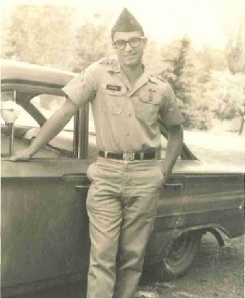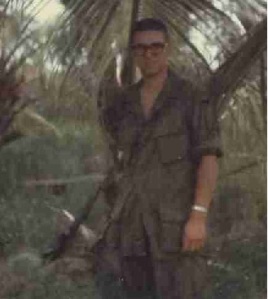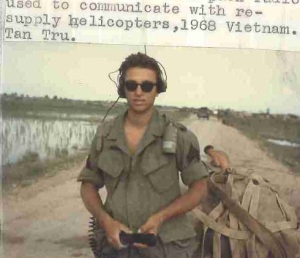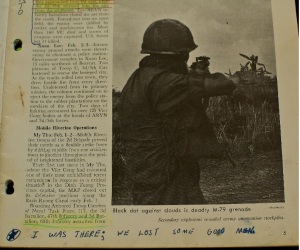Hello! My name is Leslie Raddatz and I am the daughter of a Vietnam Veteran, who suffers from Post Traumatic Stress Disorder (PTSD). I have PTSD as well and it didn’t affect me until I was 23 years old. My symptoms started out with panic attacks, zoning out, and nightmares. I was afraid to be alone and paranoid someone was trying to kill me. But, this is not about me. I’m writing about my father and what he and my family have gone through.

Before my father left home, he was young and full of life. Too young to ask questions! Obedient! Drafted had no choice!

Here is the same man but a product of the Army’s training and Vietnam War. A Solider trained to kill or to be killed!
 Here is the same man. After war, Agent Orange exposure, kidney cancer, and tumors that have metastasized along with PTSD. He suffers each day with the memories of War, worsening health, and struggles to live the rest of his life happy. Now asking questions and receiving no answers. He watches over and over the history channel of the Vietnam War trying to make sense of everything he experienced and still experiences in flashbacks.
Here is the same man. After war, Agent Orange exposure, kidney cancer, and tumors that have metastasized along with PTSD. He suffers each day with the memories of War, worsening health, and struggles to live the rest of his life happy. Now asking questions and receiving no answers. He watches over and over the history channel of the Vietnam War trying to make sense of everything he experienced and still experiences in flashbacks.On June 22, 2005, my father was diagnosed with kidney cancer. He discovered this by accident when his appendix burst. The Veteran’s Clinic couldn’t say whether or not it burst for sure so they sent him to the Veterans Hospital 90 miles away in my sister’s car.
The doctors confirmed that his appendix burst but that wasn’t the only problem he had. The doctor broke the news to my family and me that my father had two months to live. He had a large tumor on his kidney, which meant the tumor and kidney needed to be removed. There were small tumors on his lungs, spleen, pancreas, and small tumors on his other kidney.
We were dissatisfied with the care he received at the Veterans Hospital. When I learned my dad was in the Veteran’s hospital, I raced there to be with him. He was still waiting to have surgery. My sister took him to the hospital the evening before and it was now morning of the next day. I expected my father to have already gone through surgery by this time.
He was in a gown and lying in bed. I smelled a strong odor of urine as my dad lifted up the sheets to show me his catheter wasn’t in correctly so every time he had to urinate it squirted upwards all over him and the bed. My dad was covered in urine. My sister was too embarrassed to tell a nurse. I told her that from my experiences working in a nursing home that I knew they had to measure input and output on his chart. I rushed to get the nurse to assist my dad. She said, “It will be easier to fix it once they put him out for surgery.” I was outraged because my father’s dignity was not being considered while his family and anyone entering the room could smell the strong odor of urine. He felt ashamed and self-conscious while apologizing several times.
The first treatment they gave him was Interferon shots which made my father deathly ill. He was so weak that a nurse had to come in the house to take care of him, which included bathing him, helping him in and out of bed, and going to the bathroom by means of a urine container by his bedside. He was in a wheelchair because his legs were too weak to walk. He also had no short-term memory. This lasted for months.
My sister helped my dad apply for Medicare and transferred him to a regular hospital. The new doctor took him off the shots that was killing him and started him on an oral medication that restored his health to normal. After receiving physical therapy to walk and gain strength in his legs again, his independence was restored, and you would never know that he had terminal cancer.
His surgeries included: 6/22/05- Appendix removal; 8/12/05-Right kidney removed; 4/20/09- Pancreatic surgery-whipple procedure and spleen removed.
My dad tried to apply for his disability benefits through the Army and they said, “We can’t find you in our records.” “They told him they had a fire in Missouri where the files were stored.” They also asked, “Can you prove you were in the Vietnam War?”
Are you kidding me? My father was in a combat zone and was the radio repair man for company headquarters, and was a Sgt. and Radio Chief. My dad would communicate by radio to the supply helicopters the color of the flare he lit so they wouldn’t be heading into an ambush.

I was furious because my father was awarded a purple heart with an honorable discharge.
My dad remembers being blown out of the supply truck, when it ran over a landmine, while seeing his friend’s jaw hanging off his face, as he rolls and rolls for a long time. When he stops rolling, he is laying on his broken back eye to eye with a South Vietnam Soldier. My father thought he was going to be killed but instead this man put a cigarette in his mouth and stayed with him until a helicopter arrived and took him to a Mash Unit. This man saved my father’s life and I wish I could thank him. My father stated, “Thank God I didn’t have my weapon on me because I would have shot him because that is what we were trained to do. If you don’t act then you will be killed.”
My father was then airlifted back to the U.S. He remembers a huge helicopter with four or five high tiers of hanging bunk beds holding wounded soldiers. He was flown to a Denver Army Hospital. Later, my dad was relieved to see his friend that was in the truck with him when it blew up. He had a broken leg and his jaw was fixed and healing.

Thank God my dad kept his draft card, letters from home, all orders paperwork, photos, Purple Heart, video, War publications, as you see left side of all the symbols of units over in Vietnam, etc. My Dad’s symbol was the red and blue flower with white middle.
When he could prove he was in the Vietnam War, the Army asked, “Can you prove you have Post Traumatic Stress Disorder?” My dad had to start seeing a Psychiatrist and it brought up the past in order to prove he has PTSD. It caused so much pain for my father; mother and we kids knowing my dad had to again relive the memories of the Vietnam War and watching his friends die to get the benefits that were rightfully his.
My Dad’s PTSD didn’t start until he came home after his wounds healed, met my mom, got married and had four daughters. His symptoms started with night terrors, sweating, scared out of his mind as my mother tried to calm him.
My father worked with a Vietnam Veteran’s Office for 25 years. He first applied in 1987 for his back injury caused by being blown out of the supply truck. For this he only received 10% disability. He didn’t apply for PTSD because he was still in denial about it. Then in 2005, when he found out he had terminal kidney cancer, diabetes, and came to terms with his PTSD, he applied and was not approved. He went through three appeals and finally received 80% of his disability on November 1, 2009. He is still in an appeal for 100% disability.
It is no mystery to me why the Army made him wait for his benefits. They thought he would die before they would have to pay out the benefits. If not, why did they make him appeal three times when he had all the proof?
My mom testified about his Vietnam Syndrome/PTSD and the experiences that terrified her while trying to keep her four children safe. Back then, no one believed her about what was happening to my Dad. Not even his mother believed her son was mentally ill.
My mother was on her own as she looked for help and found a Vietnam Spouse Support Group that was led by a counselor who helped the women know what to do and not to do with their spouse who had PTSD.
 A passage from the book: Flashbacks in Post Traumatic Stress Disorder: Surviving Through The Flood by Leslie Raddatz:
A passage from the book: Flashbacks in Post Traumatic Stress Disorder: Surviving Through The Flood by Leslie Raddatz:I was three or four years old. “I remember one day I am about to walk into the kitchen my mom stops me with a panic look on her face as she keeps one eye on my dad as she tells me softly to stay still and not to move. I feel scared and frozen in place as I see the knife pointed at my mom. She turns her full attention to my dad who is holding a knife with a strange look on his face. Talking but I can’t understand what he is saying. I witness my mom slowly and calmly walking up to him while repeating, “It is okay. I am your wife.” “You are no longer in the war it is okay to let go of the knife.” “You are home with me and the kids.” She takes the knife out of his hands as he returns to the present and is confused as my mom hugs and kisses him saying, “It is okay honey. I love you.” As they both cry while I am still standing there not understanding what happened.”
“Other times my mother would be panicking as my father is yelling for the enemy to come out of their hiding place. While he is angrily searching around the house, she would hide us in closets throwing jackets, shoes, blankets on top of us so he wouldn’t find us. She told us not to come out until she came for us. If we had to go to the bathroom during the night, we would urinate down the heating vent because we were afraid to go downstairs.”
My flashbacks of my Dad with his PTSD episodes came out after being in therapy for months doing the EMDR and Brain Spotting therapies because I didn’t feel safe and I was paranoid that someone
was trying to kill me. I am now 35 years old.
My Dad talked about the blind trust young soldiers have when entering the army. He expressed his anger as he sees more young men enlisting and proud to fight for their country. My dad said, “Knowing what I do now, I feel disturbed knowing the young men are going to war and a lot won’t make it back home. They have no idea what they got themselves into. If they make it home, then PTSD takes their life and they suffer or kill themselves or their families. We see it over and over again in the Media and Newspapers.”
My Dad’s advice to soldier’s coming home now is to keep all your paperwork, photos, uniforms, etc so you can prove you were in the war. Also to get counseling immediately to discuss war experiences, loss of friends, and guilt for what they had to do to survive, difficulty reintegrating back to being home, PTSD symptoms and mental illness so they don’t affect their families. My dad stated, “The war teaches you to be a killer and not to cry or show emotion.” “This has to be talked about and the thinking reversed so they can try to live a normal, loving life with their families.”
Currently, January 12, 2011, my Dad is undergoing testing to decide whether or not to take his left kidney out because there are three large tumors on it, kidney function is failing and to start dialysis. His red blood count is also low and they may have to start blood transfusions. He also has two large tumors on his lungs and they may try to do surgery to take them out, if they are operable. His cancer, tumors, and diabetes are thought to be the lasting effects of Agent Orange Exposure.
_________________________________________________________________________
 I, Leslie Raddatz, am the author of the book: Flashbacks in Post Traumatic Stress Disorder: Surviving Through The Flood which will be published later in 2012. It illustrates the affects that PTSD can have on a child when her parents’ parental care fails, and the child is abused throughout her life because of the experiences of terror, survival on her own, lack of boundaries, protection, and the patterns it leads her to as well as through the healing process with therapies such as the EMDR, Brain Spotting, Attachment Therapy, Positive Imagery and Ego State therapy.
I, Leslie Raddatz, am the author of the book: Flashbacks in Post Traumatic Stress Disorder: Surviving Through The Flood which will be published later in 2012. It illustrates the affects that PTSD can have on a child when her parents’ parental care fails, and the child is abused throughout her life because of the experiences of terror, survival on her own, lack of boundaries, protection, and the patterns it leads her to as well as through the healing process with therapies such as the EMDR, Brain Spotting, Attachment Therapy, Positive Imagery and Ego State therapy.
For more information about my story and about warning signs and therapies for PTSD, please visit www.silencednolonger.com and www.silencednolonger.blogspot.com. The blog has a place to leave comments on the discussions. If you do not want to leave a public message, please email me at lraddatz1@gmail.com and I will respond to your comments or questions in private.
Leslie Raddatz Author / Survivor of PTSD & Daughter of a Vietnam Veteran with PTSD Photos in this article that includes the Purple Heart, Leslie’s photo, and two war magazines by: Alex & Natalie Photography- http://alexandnatalie.com / Experience their professionalism, creativity, and personal touch they bring to each photo project


I went to your blog and it is cool It is in a different language but it looks nice and I love the map at the bottom of the page that is cool. I also was impressed on how many followers you have.
ReplyDelete